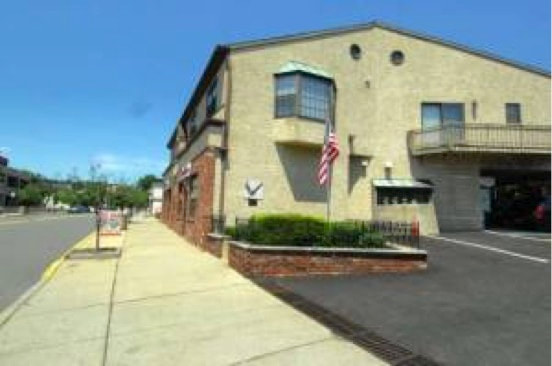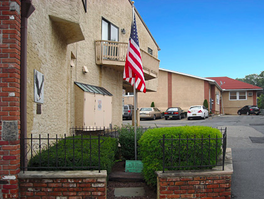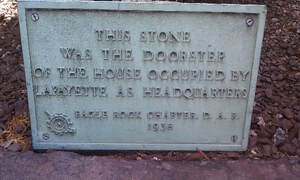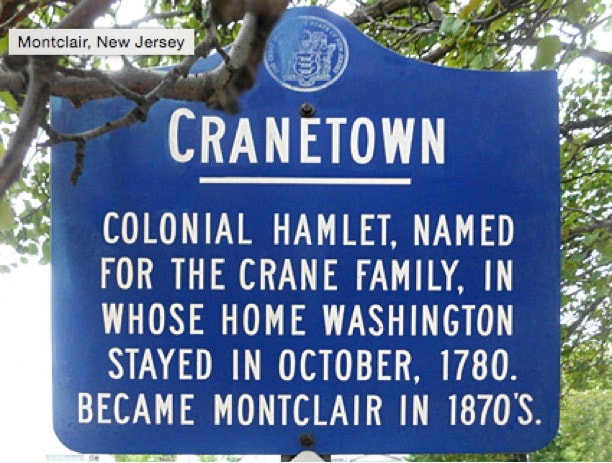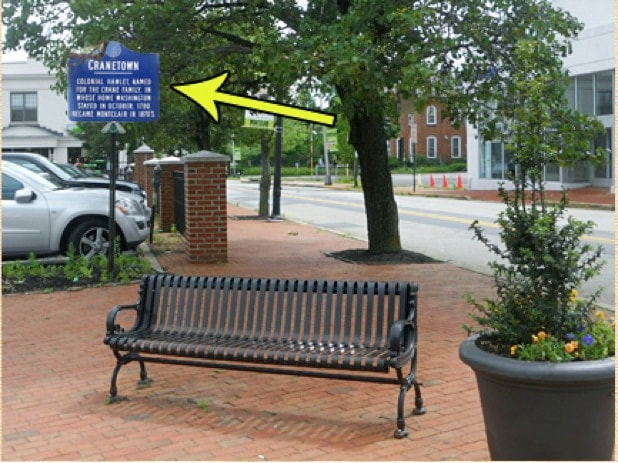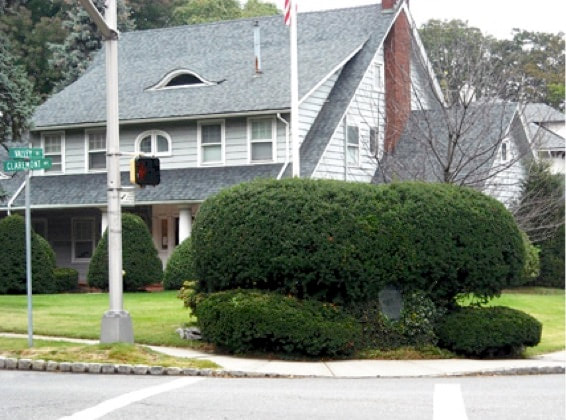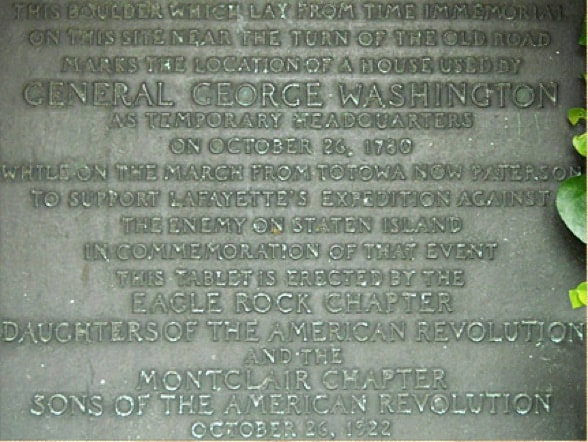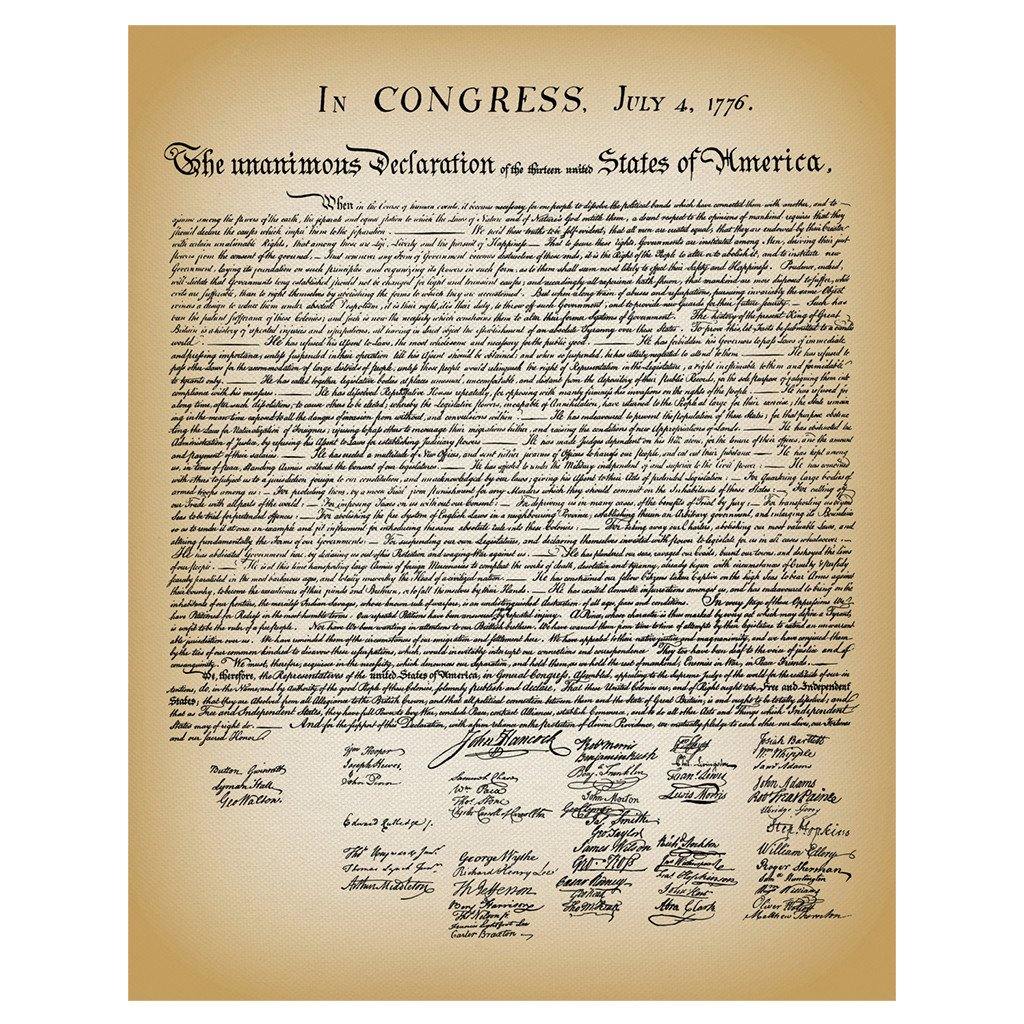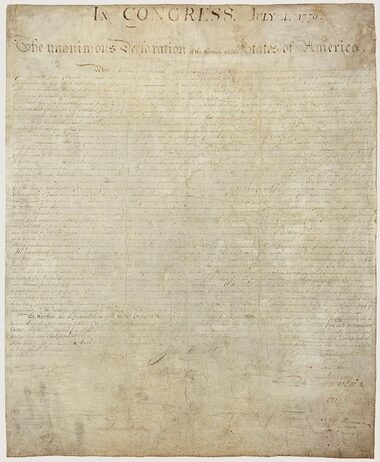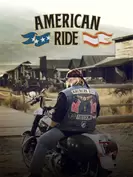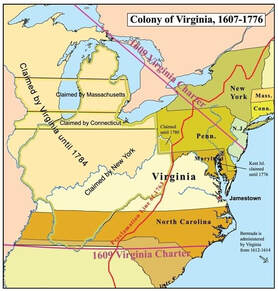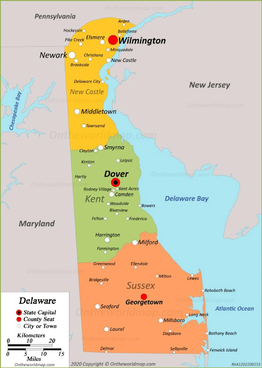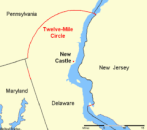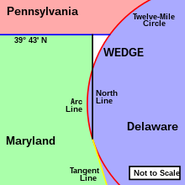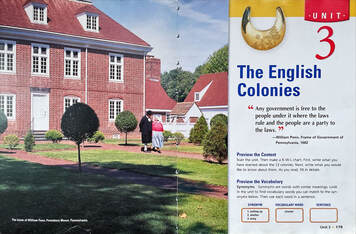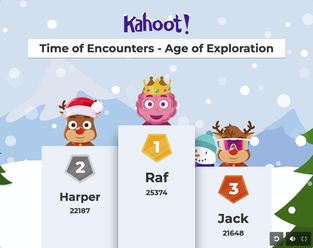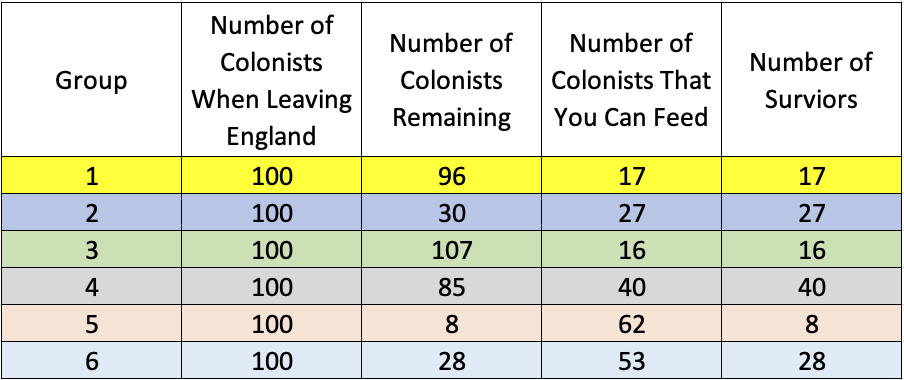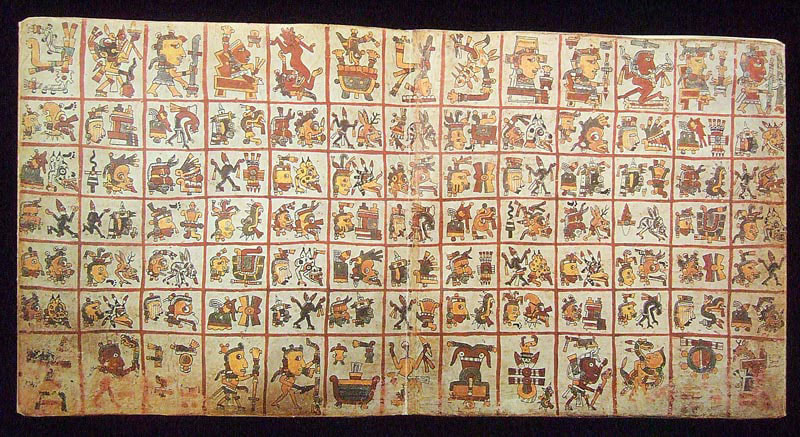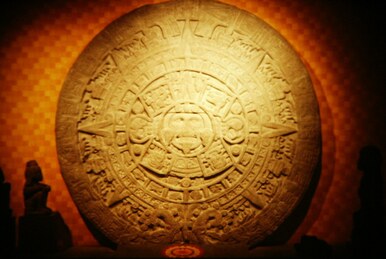You may have heard about the “motorcycle history guy.” I came across this show more than a decade ago. I love that he teaches history as a story. There are ten seasons of great stuff. The kids wanted to know if they could watch these at home. I love that! Yes, they can watch these online. Here is the link… https://www.byutv.org/american-ride/episodes/season-1
Wednesday, June 19th: The kids had a build-off today, but it was a little different... The kids sitting on the chair had their hands in the box, but couldn't see the pieces. The kid on the stool had a picture of the finished piece, but could see in the box. The other student(s) in the group could see in the box, but couldn't see the picture or touch the pieces. Is it even possible? I wasn't sure, but it sounded like something I would like to try! The kids did a great job. Check out some pictures of their process...
Tuesday, June 18th: We finished the letter. They are now put to sleep for the next seven years. When your kid gets this back, they will be 18!!!
Monday, June 17th: We had shorter classes because of the wildly entertaining Bradford Talent Show, but we still made the most of the time we had. Today was day one of the letter writing to your future self. We discussed why the kids write a letter to their future selves and why they should take this seriously. There were suggestions given for the type of material that could be included, but in the end... it was entirely up to the individual kid. I have not read any of the letters, nor will I ever read them. I will hold onto them until these kids are ready to graduate high school and magically get them into their hands.
Friday, June 14th: We broke the South, now we have to fix it.... Reconstruction. We started with talking about the assassination of Lincoln. We then looked at the what could have been and what was, and how those actions have affected this country ever since. 13th, 14th and 15th Amendments were covered in course of learning about Reconstruction. This is it. Social Studies is done. We have made it from the Early People, the Age of Exploration, the English Colonies, the American Revolution, a New Nation, and lastly, the Civil War. We covered a couple of thousand years, learned a bunch, and had fun doing it!

Wednesday, June 13th: The American Civil War is a subject that people study their whole lives, Amazon has more than 40,000 books listed, and we covered it in two days. The kids got the highlights and will have more time on this in 7th and 8th grade and again in high school.
My favorite story is that the war kind of begins with the Battle of Bull Run/Battle of First Manassas on the farm of Wilmer McLean. He and his family had to hide in their fireplace because of the bullets and shells landing all around the house and hitting it. He knows that this war is going to be terrible, so he moves 120 west. Four years later, General Lee surrenders to General Grant. Where does the surrender signing take place... Wilmer McLean's new house. So many people keep coming to see where the war ended, but no one wants to buy it... so he just walks away and gives it up.
My favorite story is that the war kind of begins with the Battle of Bull Run/Battle of First Manassas on the farm of Wilmer McLean. He and his family had to hide in their fireplace because of the bullets and shells landing all around the house and hitting it. He knows that this war is going to be terrible, so he moves 120 west. Four years later, General Lee surrenders to General Grant. Where does the surrender signing take place... Wilmer McLean's new house. So many people keep coming to see where the war ended, but no one wants to buy it... so he just walks away and gives it up.
Monday, June 10th: We looked at 84 years of compromises, starting with the Constitution, Missouri Compromise, Kansas-Nebraska Act, and Compromise of 1850, which led to more problems with Dred Scott, John Brown, and Nat Turner. The problem is that they are compromises and not a solution to the question of whether slavery will exist in the USA.
Friday, June 7th: Today was Run-a-Thon. The kids love it, but we lose about half of each class's time so that the kids can help with the younger grades. We still made the most of the class time that we did have. Every day, we begin by reviewing the previous day's or day's material. The kids felt like they understood the New Nation unit well, so we made a deal. Instead of reviewing for a test, if the kids did better than 70% on the Kahoot! review, then there would be no need for a test. The review is done on their Chromebooks. We do this together, and the kids get 20 seconds to answer each of the 30 questions. They did great! That is why they are not studying for a text next week.

Thursday, June 6th: Manifest Destiny was the idea that it was God's will that the United States should expand to the Pacific Ocean. It was also a way to keep other countries from forming in North America. We didn't like that idea after seeing all the countries in Europe fighting each other for a thousand years. No neighbors = no wars. The kids taught each other how the country got put together. They started with how Texas was formed by Moses Austin originally as a colony with permission form Mexico. Why were the trails, such as Oregon, Santa Fe, Old Spanish, California, and Mormon, created to bring people west? Who the Mormons were, and how they settled in the Great Basin. How a victory in a war with Mexico ended up with them giving up the south west and the USA giving them $15 million. Is it strange to take someone's land and then pay them for it? We finished with the discovery of gold in California and the ensuing Gold Rush.
As if that wasn't enough, we closed out the class discussing the Industrial Revolution.
As if that wasn't enough, we closed out the class discussing the Industrial Revolution.
Wednesday, June 5th: We started the day looking at the presidency of Andrew Jackson. He was unique because he was the first president elected from a Western state... Tennessee. He was also the first president not to be a founding father or son of one. He came from nothing and was not formally educated but was self-taught. He represented the common people in ways the first six presidents did not. I suppose that was part of his charm. He believed that all citizens should play a greater role in their government. This included voting, which had expanded to all white men, not just wealthy white men. It sounds terrible, but it is progress.
Manifest Destiny was also researched by groups of students who presented their findings to the class. We will finish this tomorrow.
Manifest Destiny was also researched by groups of students who presented their findings to the class. We will finish this tomorrow.
Tuesday, June 4th: Election Day, so we had to stay home. Very sad day for the students and teachers.

Monday, June 3rd: The kids started class by performing a play about the Star Spangled Banner. Their favorite part was the doctor's name that Francis Scott Key was trying to get the British to release... Dr. Beanes. If you are ever in Washington, D.C., stop by the National Museum of American History to see the actual flag flown over Fort McHenry after the British stopped firing. Next, we looked at the country after the War of 1812. Things were going so well that this time was called The Era of Good Feelings. We are feeling so confident President Monroe will issue The Monroe Doctrine, which tells the world they can no longer colonize the Americas. At the same time, we got Spain to give up claims on West Florida, which had already been annexed because Andrew Jackson had taken it by force years earlier. Now, we buy East Florida from the Spanish. We are filling out the map.
Friday, May 31st: "What goes around comes around" is fitting for our lesson today, because we burned the capital of Canada (York - later named Toronto), and the British came and burned Washington DC. That is correct; we are studying the War of 1812. We learned about some of the causes (impressment of American merchants by the British on the high seas and forts in the west still occupied by British soldiers) and where the war was fought (the sea battles on the Great Lakes and our invasion of Canada, the burning of Washington DC, the most lopsided victory in American history that introduced the world to Andrew Jackson... Battle of New Orleans and the Battle of Baltimore... Defense of Fort McHenry). Here is a great link to the Star Spangled Banner (the big flag from Fort McHenry)... FLAG
Thursday, May 30th: The Nation Grows will be the topic for the next few days. We started by learning about Thomas Jefferson's real estate deal... 800,000,000 square miles of the Louisiana Purchase. He literally doubles the size of the country. Now, what is out there? Lewis and Clark will travel with the Corps of Discovery to report back to Jefferson what is out there.
Wednesday, May 29th: We also started work on our Washington DC project. Every 5th grader randomly received a person/monument/university/building/park/museum/statue... that is connected with DC. When we are done, we will have a rather complete and interesting visitors guide for your next trip to Washington DC.
Tuesday, May 28th: We reviewed the government that the Constitution created and the kids did really well. The government looks like it will be a success, but something is missing... the kids figured out that all the positions of the new government needed to be filled, so there must have been a lot of elections. When it came time for a president, the kids figured that it could only be one person, George Washington. Yes, they know that he was the first president of the new government, but now they could explain why he was the only person that could have been the first and elected unanimously. See if they can talk to you about this.
Friday, May 24th: The Constitution has been ratified (fancy word for approved), but it is missing something... how about defining our rights! We discussed the Bill of Rights and what they mean. There are a couple of good videos added.
Wednesday, May 22nd, and Thursday, May 23rd: What does the Constitution of the USA do for us? Great question... it tells us how the federal government is set up. We learned about the three branches of government... legislative, executive, and judicial. Since the convention didn't want to create a king, they ensured each branch had limits (checks and balances). More on that and our rights tomorrow.

Tuesday, May 21st: The Great Compromise was the topic for the day. The Constitutional Convention (which met to discuss changes to the Articles of Confederation but decided to create a new government... not that anyone asked them to do this... or gave them the power to do it) is four hot months in Philadelphia with the windows shut to make sure there is absolute secrecy. Sounds hot. We discussed the Virginia Plan and the New Jersey Plan and how the delegates compromised. We also looked at the other part, which is uglier: the 3/5th Compromise.
Monday, May 20th: The Constitutional Convention was today's topic. Turns out the Articles of Confederation could not be fixed, so the 55 delegates decided to just throw them out and create a new form of government. No one asked them or gave them power to do this. They even spent the summer in Philadelphia with the windows closed, curtain drawn, and soldiers outside... all to keep what was happening inside a secret. Next up... what does this new government look like.

Friday, May 17th: The central government under the Articles of Confederation faced its first real challenge. Farmers were mad about the courts taking their farms for unpaid taxes and debts, so they closed the courthouses. I suppose that would work, at least for a while. Daniel Shays decides to go even further and takes the central government's arsenal in Springfield, Massachusetts. Is this the start of another revolution? The central government is powerless to stop him, so Massachusetts will send their soldiers to put down the rebellion. America is not off to a good start.

Thursday, May 16th: A New Nation. We started the class with a new unit called A New Nation. When we last left our newly independent Americans, the country was preparing to start down the unique road of democracy (republic). What could go wrong? The students learned that the government set up by the Articles of Confederation was not working out so well. Sure, the states loved having all the power, but nothing was getting done as a country. We will continue through the Constitution, Washington DC, expansion of the country, work in a war or two, and end right before the Civil War. It is going to be FUN!
Wednesday, April 24th: Test day.
Tuesday, April 23rd: Kahoot! today. We finished our review and the kids seems to be in pretty good shape. We will find out tomorrow if that is true...
The Revolutionary War test will be next week. We will review on Monday and take the test on Wednesday (April 24th).
Friday, April 19th: With the war behind us, it is time to look to the sky for what is next... our solar system. Over the next few weeks, the kids will learn about our solar system and there is a lot to learn. My goal is to get the kids excited about the topic. We can only scratch the surface, but we will open our eyes to the vastness, beauty, terror, and majesty of the solar system, galaxy, and universe. First up is a research project on a planer that the kids started today.
Thursday, April 18th: It's over! The world has turned upside down. With help from the French, the Americans defeated Cornwallis and the British at Yorktown. A band of rebels fought and won their independence. We closed out the unit by saying goodbye to George Washington. The kids discussed what they would have done if they were in his position... his generals offered to back him to take the country and become king. He declined and resigned from the army! What did it look like... check out a $5,000 in your pocket or the one below...
Wednesday, April 17th: The kids had Field Day at MSU. There was great weather and the kids had a ton of fun. In our shortened classes, we moved the Revolutionary War to the south. It's the same story as the north.... The British take the ports and cities... Savannah, Charleston, Camden, but can't beat the Americans. A surprise win at Cowpens, SC gave the Americans a decisive win, forcing the British back towards the coast. Yes, the British whoop us at Guilford Court House, NC, but was a pyrrhic victory. That is a fancy word for a win that was too costly to have fought. Cornwallis has lost too many men and is too far from supplies. He will pull back to what he believes is the safety of Yorktown. The kids will learn how he moved himself into a checkmate position tomorrow.
Tuesday, April 16th: The students discovered how Washington turned his army of farmers, merchants and shopkeepers into soldiers... Baron Friedrich Wilhelm August Heinrich Ferdinand von Steuben. The kids got a kick out of the fact that he claimed to be so much, but in the end, he turned out to be a bit of a fraud. But that's ok by Washington. He thought it was more important what you could do and not what title you were born with (at least that is what I think). I can't be far off because Washington made him the army's Inspector General (with the rank and pay of a major general).
So what was today all about? Valley Forge and heroes of the war...
Ethan Allen and the Green Mountain Boys: Battle of Saratoga and capturing Fort Ticonderoga
Nathan Hall: American spy that was hung. His last words... "I only regret that I have but one life to lose for my country".
John Paul Jones: After the British naval officers tell him to surrender, because he has no hope... he says... "I have not you begun to fight!". He keeps fighting and the British ships surrender to him.
Francis Marion: The Swamp Fox of South Carolina who led daring raids against the British
George Rogers Clark: Led men to protect the settlers in the frontier lands from British and Indian attacks.
Want to read the founders words... click here!
Ask your child how Montclair is tied to the Revolutionary War... here are a few pictures to help...(also check out this site for more New Jersey Revolutionary sites).
So what was today all about? Valley Forge and heroes of the war...
Ethan Allen and the Green Mountain Boys: Battle of Saratoga and capturing Fort Ticonderoga
Nathan Hall: American spy that was hung. His last words... "I only regret that I have but one life to lose for my country".
John Paul Jones: After the British naval officers tell him to surrender, because he has no hope... he says... "I have not you begun to fight!". He keeps fighting and the British ships surrender to him.
Francis Marion: The Swamp Fox of South Carolina who led daring raids against the British
George Rogers Clark: Led men to protect the settlers in the frontier lands from British and Indian attacks.
Want to read the founders words... click here!
Ask your child how Montclair is tied to the Revolutionary War... here are a few pictures to help...(also check out this site for more New Jersey Revolutionary sites).
Monday, April 15th: The kids were rested from spring break and ready to fight the Revolutionary War. We compared the two armies and decided that the Continental Army could not beat the British. After being defeated by the British in Long Island and pushed west with more losses, it seemed like we were right... the British would win. We read, watched, and talked about the early victories that helped change the direction of the war. The Battle of Trenton and the Battle of Princeton were not strategically important but a morale booster for Washington's army. The Battle of Saratoga was the other battle we focused on because it was a game-changer... The Continentals beat a larger British army and captured almost 6,000 soldiers (the British had about 50,000 soldiers in the colonies). Over in France, Ben Franklin finally had something to show that the Americans could win and that siding with them would not be a lost cause. The British knew that they would not be able to beat the colonists easily (if at all). Lastly... the Continental Army didn't do a lot of winning during the war.
Friday, April 5th: We finished the week by learning about who was on each side of the war. Patriots who wanted independence, Loyalists who were loyal to the king, and people who didn’t care which way it went (neutral). They also discovered that the divisions were everywhere, even in religions, towns, and families.
Thursday, April 4th: We took a break from the Revolution to learn about the solar eclipse that will take place on April 8th. Ms. Monetti, Ms. Freeh's student teacher, was our guest teacher. She needed one science observation to complete her student teaching, so I offered your kids. Ask your kid what they now know about an eclipse. We are not in the best place on Earth to see the eclipse next week, but we still get about 50%-70% of totality. Just make sure not to look directly at it! There are glasses you can buy or your kid can build you an indirect viewer from a cereal box. They were given instructions to take home.
Check out this link for more information on the eclipse...
https://www.timeanddate.com/eclipse/globe/2024-april-8
Check out this link for more information on the eclipse...
https://www.timeanddate.com/eclipse/globe/2024-april-8
Wednesday, April 3rd: Revolutionary War... WOMEN! There were many women who made contributions to the war effort. Some help make uniforms, some tended to the wounded, some were spies, and some even fought (until they were found to be women)... and some even got a military pension! The kids researched a a person and reported their information to the class.
Tuesday, April 2nd: The Declaration of Independence is finished, signed, and read to the people. It is official... we broke up with England. The kids read The Travels of the Declaration of Indepence in class. It is available on this site under the "Books" tab. If you hover over "Social Studies 2023-24" it will drop down. It is another case of there being more to the story that we heard growing up. The kids answered questions and we discussed their work.
|
Monday, April 1st: Our friend from American Ride told us about the Green Mountain Boys taking Fort Ticonderoga from the British. This is an interesting story, so ask your kid to tell you about it. Click on his picture to see all the episodes if you are interested in a different type of telling of US history. Next up was Thomas Paine's Common Sense, which gave reasons for splitting from England. It was just common sense, haha. We finished the day learning about the four parts of the Declaration of Independence and the five writers. I think the kids really got the point of what a big and dangerous step this was when they understood the last line... "we mutually pledge to each other our Lives, our Fortunes and our sacred Honor."
|
Thursday, March 28th: It was an extensive review day. We reviewed the quiz, a summary of Lexington and Concord, a timeline, highlighted sections of the Olive Branch Petition, notes from A Foreign War, and watched a couple of fun parody videos. The kids did a great job in my absence and did not give the sub a hard time. This is the end of our time with England. Next week, we will separate and begin to fight.
Wednesday, March 27th: The kids had various items to get through today. They started by reading the Olive Branch Petition and highlighting all the over-the-top wording about how great the king was and being part of England was so special... from the colonist's point of view. Here is an example... "We, your Majesty's faithful subjects of the colonies" or "The union between our Mother country and these colonies, and the energy of mild and just government, produced benefits so remarkably important, and afforded such an assurance of their permanency and increase, that the wonder and envy of other Nations were excited, while they beheld Great Britain rising to a power the most extraordinary the world had ever known." This is after we dumped their tea, refused to pay Parliament's taxes, killing or wounding over 1,200 British soldiers at Lexington and Bunker Hill. The kids took a quiz and moved on to a bit of note-taking on the last steps to the Declaration of Independence. Lastly, they had to make a timeline of the significant events from the end of the French and Indian War to the Olive Branch Petition.
Tuesday, March 26th: The Second Continental Congress had a get together on May 10, 2775. The were hoping for peace, but also preparing for war. The kids got to learn how George Washington became the commander-in-chief of the Continental Army, which didn't really exist yet. On the very next day up in Boston, the war has started on Bunker Hill (even though it took place on Breed's Hill).
Monday, March 25rd: The kids got first-hand experience with Parliament making taxes on the colonists. We played a game where the kids drew slips from a cup to see what they would be... one king, two members of Parliament, two tax collectors, and the rest were colonists. The kids were paid in Starbursts. While that was happening, the Parliament kids were making up some taxes. Things like... tax of two Starbursts if you are wearing a sweatshirt, one Starburst if you have a water bottle on your desk... What was interesting was a kid who tried to avoid paying their taxes to the tax collectors. They had to go before the judge, who was appointed by the governor, who the king appointed. There was no surprise about the verdict since the colonists had lost their right to a trial by jury. We watched American Ride to learn about Lexington and Concord. It is a great show, and the host was fantastic. We also spent sometime learning about what life was like when George Washington was growing. The book we used can be found under the "Books" dropdown on the "Social Studies 2023-24" tab.
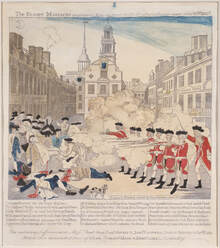 The Boston Massacre through the eyes of Sam Adams and Paul Revere
The Boston Massacre through the eyes of Sam Adams and Paul Revere
Friday, March 22nd: Escalation... I think that is the best word to describe the situation between the colonies and the Parliament that we are investigating. We looked at the Boston Massacre, the Boston Tea Party, the Intolerable Acts, and finally, the Declaration of Rights and Grievances petition to the king. The students came up with options that each side could have taken at each step and their possible consequences. We also got another great quote from Patrick Henry... "I know not what course others may take, but as for me, give me liberty or give me death!" Listen carefully on Monday... you will hear the shot heard round the world.
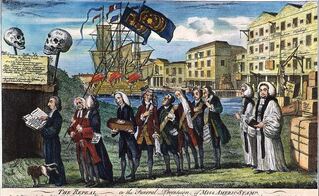 Who says propaganda is something new?
Who says propaganda is something new?
Thursday, March 21st: Presentation day. The kids began teaching "The Colonists Speak Out". This is the groundwork being laid for the Revolutionary War. We covered the Sugar Act, Stamp Act, and the Stamp Act Congress. The kids got a good picture of why the "colonists" are getting frustrated with England and its rules. The colonists seem like teens who don't want to hear it from their parents. There were two big quotes today... James Otis' "No Taxation without representation" and Patrick Henry's "If this be treason, make the most of it".
Wednesday, March 20th: Today was odd. Classes were shortened because of the early dismissal, and kids were pulled out all day for instruments. To make the most of our time, the kids worked on researching a topic and preparing to teach it to the class tomorrow.
Tuesday, March 19th: Today was the beginning of the end. The kids learned about the Proclamation of 1763, which tried to limit the rights of the colonists by telling them not to settle the land won in the French and Indian War/Seven Year War (...that lasted nine years). Mostly, it sowed the first seeds of the Revolution.
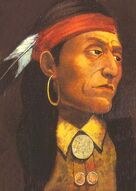 Chief Pontiac
Chief Pontiac
Monday, March 18th: We started class by reviewing the science test. The kids did great. The average score across all three classes was 91%. Back to social studies. We saw the conclusion of the French and Indian War by the British cutting off the French in Canada from Europe. The Spanish jumped in to help the French in the end, but that ends up costing them. They will lose Florida, but the French will give them all their lands west of the Mississippi as an apology? Or better to let the Spanish have it than the British. France will lose Canada and the Ohio Valley. Peace doesn't last long for the British. Chief Pontiac unites tribes and start to take British forts. Eventually, England made peace treaties with the native people, and the fighting ended.
Interesting tidbit I read to the kids and had them think through and explain the quote...
From A History of US... "Washington and 150 men tried to make them (French in the Ohio River Valley) go. They attacked a French scouting party and killed 10 Frenchmen. An English writer, Horace Walpole, said of the small battle, "The volley fired by a young Virginian in the backwoods of America set the world on fire." It was 1754; the French and Indian War had begun."
Fun fact... Two years after George Washington is defeated at Fort Necessity, he returns with English General Braddock and 1,800 English and Colonial troops. 900 French and Indian soldiers kill or wound two-thirds of the English. The French fire from behind trees and boulders, while the British try to fire in line formation. Braddock is killed along with other officers. George Washington takes charge and survives the battle with four bullet holes in his coat and two horses shot from under him. How things would have changed if one of those bullets was a few inches to the left or right. Washington has learned a valuable lesson in the defeat... a smaller force can defeat a larger and better trained one. He probably felt pretty lucky!
Interesting tidbit I read to the kids and had them think through and explain the quote...
From A History of US... "Washington and 150 men tried to make them (French in the Ohio River Valley) go. They attacked a French scouting party and killed 10 Frenchmen. An English writer, Horace Walpole, said of the small battle, "The volley fired by a young Virginian in the backwoods of America set the world on fire." It was 1754; the French and Indian War had begun."
Fun fact... Two years after George Washington is defeated at Fort Necessity, he returns with English General Braddock and 1,800 English and Colonial troops. 900 French and Indian soldiers kill or wound two-thirds of the English. The French fire from behind trees and boulders, while the British try to fire in line formation. Braddock is killed along with other officers. George Washington takes charge and survives the battle with four bullet holes in his coat and two horses shot from under him. How things would have changed if one of those bullets was a few inches to the left or right. Washington has learned a valuable lesson in the defeat... a smaller force can defeat a larger and better trained one. He probably felt pretty lucky!
|
Thursday, March 14th: We were introduced to a 21 year old George Washington. Not the father of our country George Washington, but starting down the path that will get him there. Today's topic was the French and Indian War. By the end class, ever student was able to tell me that the war was not between the French and the Indians. We have lofty goals in this class! Tomorrow, we have our science test, but we will return on Monday to close the French and Indian/7 Year War. I found a pretty interesting picture that shows just some of the confusion of colonies and countries claims in North American (photo to the right).
|
Wednesday, March 13th: As Tracy Chapman said, we began "Talkn' bout a Revolution". The American Revolution to be exact. Today was the introduction. We began by sharing what the students already knew. We then looked at a time line that started with the French and Indian War and ended with the Revolutionary War being won by the USA. That is what we will be covering over the next month or so.
February 16th: Test day turned out to be less scary for the kids when they realized they were prepared. The kids did such a great job on test today, that I told them they can take Monday off. We are off on Monday (2/19) for Presidents' Day and early dismissal on on Thursday (2/22). This is the end of social studies for now, but there is talk of a revolution in the air...
February 15th: We had our trip to Montclair State today for a poetry lesson and learned about Yogi Berra. We discussed tomorrow's test. The kids are ready and about 90% less nervous. The study guide is next to February 12th's blurb. Here is the test...
* They need to know the colonies and where they are on a map
* True and False questions
* Matching
* Multiple Choice
* Fill in the Blank
* Short Essay/Paragraph
* They need to know the colonies and where they are on a map
* True and False questions
* Matching
* Multiple Choice
* Fill in the Blank
* Short Essay/Paragraph
February 14th: We are back to work after a surprise snow day. The kids finished their brochures and we we played Kahoot! to review for the test on Friday. Tomorrow, we are going to Montclair State for a poetry field trip. The weather will be brisk and the walk is about 20 minutes. The kids can handle both of those.
|
February 12th: I was out today, but the kids worked for the sub and from what heard... behaved well. Not that I would expect any different. The sub handed out the study guide for the test on Friday. I am also going to attach it here...
|
| ||||||
February 9th: The kids were randomly assigned a colony to create a brochure. They have been hired to help increase the number of people coming to their colony. A trifold brochure and poster seem like a great way to do this. The kids started today and will have Monday to complete the project. It is a good timimg, because I will be out on Monday. On Tuesday, we will have a Kahoot!, a study guide, and a review for the 13 Colonies Test, which will be on Friday, 2/16. The kids will have time left on Tuesday to work on their brochures.
February 8th: The kids read about the Southern Economy. Then, they put what they learned today and over the last few weeks to work. The kids created a Venn diagram in groups with three circles... one for each colonial region. This was different than the ones they had seen in the past because the three circles created another set of joined sections.
As of now, we should have our 13 Colonies Test on Wednesday, February 14th. In class review and study guide will be provided.
As of now, we should have our 13 Colonies Test on Wednesday, February 14th. In class review and study guide will be provided.
February 7th: The students finished learning the who, how, and when of the founding of the Southern Colonies… from Catholics in Maryland to debtor prisoners in Georgia. Along the way, the kids also learned a bit about the monarchs of England and how they affected the colonies. We will next look at their economies and compare and contrast them to the Middle Atlantic and New England Colonies.
February 6th: That seems like one big colony! Yes, Carolina was too big. King Charles II granted land from the bottom of Virginia to the top of Spanish Florida to the Lord Proprietors. That's a pretty cool name. They backed Charles II to get the throne since his dad lost his head and Oliver Cromwell became the Lord Protector of England. Yes, Cromwell was the Puritan who wasn't much fun. In the end, Carolina needed to be broken up. The top 2/3 became North Carolina (mostly smaller farms) and South Carolina (this is where you will find the big plantations). The bottom will become Georgia, but that is for tomorrow.
February 5th: The kids had their quiz on the Middle Atlantic Colonies, which went fine. I know there was a lot of concern, but I don't see why that was the case. I told them this was to help them understand where they stand with the information. We also reviewed before class each day. Anyway, it is done, and they did great. Time to move one... We headed south from the Middle Atlantic Colonies. The students learned the hows, whos, and whys of the Southern Colonies.
February 2nd: The class read more about The Great Wagon Road today. We also reviewed for the quiz on Monday. Don't worry... it is a check to see what they understand. The quiz will be used to study for the test once we are done with the southern colonies. That is the one they should study for. There will be a review and a study guide.
We spent the majority of our time talking about Black History Month. I want them to understand a couple of points... Black History is American History. Black History is part of all of us, no matter our race or nationality. It is part of the American History! That being said, Black History doesn't begin on February 1st and ends on February 29th. It is ongoing and part of lessons throughout the year. Today's question from Dr. Aboushi was, "What year did Black History Month begin?" If your kid doesn't remember... 1926 by Dr. Woodson, although it started as a month. It wasn't until 1976 that President Gerald Ford officially recognized Black History Month.
We spent the majority of our time talking about Black History Month. I want them to understand a couple of points... Black History is American History. Black History is part of all of us, no matter our race or nationality. It is part of the American History! That being said, Black History doesn't begin on February 1st and ends on February 29th. It is ongoing and part of lessons throughout the year. Today's question from Dr. Aboushi was, "What year did Black History Month begin?" If your kid doesn't remember... 1926 by Dr. Woodson, although it started as a month. It wasn't until 1976 that President Gerald Ford officially recognized Black History Month.
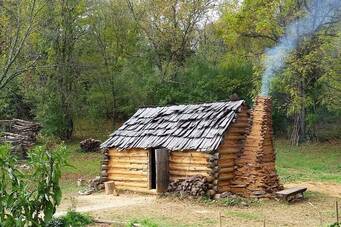
February 1st: There is no quiz this Friday. We will have our Middle Atlantic Quiz on Monday.
We finished up the Benjamin Franklin presentations and headed out to the backcountry. The backcountry was the frontier in the early 1700's. The Great Wagon Road brought settlers to the other side of the fall line (geographical occurrence of falls and rapids where rivers and streams cross it - can't navigate the waterway in a boat) into the Piedmont (foot of the mountains). The road was originally an Indian trail, but over time, it was enlarged to the point that animals and carts could pass. Wider, but not better. As a child, Daniel Boone and his family left Pennsylvania and spent a year traveling on the road to get to the Yadkin Valley in North Carolina. In 1770, he "found" the pass through the Appalachians that would see more than 200,000 people pass through into Kentucky. The kids also got to see what a home on the frontier looked like… log cabin, one room, no windows, leaves on the floor to sleep on… the perfect weekend getaway!!!
We finished up the Benjamin Franklin presentations and headed out to the backcountry. The backcountry was the frontier in the early 1700's. The Great Wagon Road brought settlers to the other side of the fall line (geographical occurrence of falls and rapids where rivers and streams cross it - can't navigate the waterway in a boat) into the Piedmont (foot of the mountains). The road was originally an Indian trail, but over time, it was enlarged to the point that animals and carts could pass. Wider, but not better. As a child, Daniel Boone and his family left Pennsylvania and spent a year traveling on the road to get to the Yadkin Valley in North Carolina. In 1770, he "found" the pass through the Appalachians that would see more than 200,000 people pass through into Kentucky. The kids also got to see what a home on the frontier looked like… log cabin, one room, no windows, leaves on the floor to sleep on… the perfect weekend getaway!!!
|
January 31st: Philly’s most famous resident… Benjamin Franklin! In their groups, the kids researched and presented an aspect of Franklin's life. We learned about his time indentured to his brother in Boston, which he hated and ran away from. His rise to prominence was based on his printing skills and a little luck. On his first day in Philly, he met Mr. Reed, who hired him as a printer and would become his father-in-law. Poor Richard's Almanac, which would make him extremely wealthy. One group found and explained some of his sayings. Their favorite was, “Don't throw stones at your neighbors if your own windows are glass.” Another group talked about all his inventions... bifocals, odometer, stove, hand paddles for swimming, daylight savings time, lightning rod... the strangest... the armonica (click on the picture to hear it). We also heard about his role as a founding father and what that means.
|
|
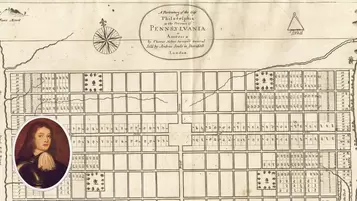
January 30th: What do pie and Pennsylvania have in common? William Penn wanted the townships to be 5,000 acres and divided among 10 families. The land should be in the shape of a circle and divided. Each family gets a “slice” of the pie, and all the homes built at the tips. We also learned about Penn’s idea for laying out Philadelphia (grid and parks). We also discussed how William Penn's ideas of freedom of speech, freedom of religion, freedom of the press, and trial by a jury of peers will end up shaping the United States.
January 26th: Presentation day... "WOW" is the word I would use to describe the students' work. Their research has gotten so much better. Their time management has also greatly improved. They felt like they needed more time at the start, but having less time forced them to focus on what they needed to do, and they got it done.
January 25th: The Breadbasket Colonies. Sounds delicious! We started our study of the Middle Atlantic Colonies by turning the teaching over to the kids. Each group is responsible for one colony... Delaware, New York, New Jersey, and Pennsylvania. The kids researched and built a Google Slide presentation. Tomorrow, they will get up and present to the class. Same rules as always... pictures on the slides are great. Words on the slides are not great. They know they are the experts and must present the information to the class. They will be allowed to use notecards. Hopefully, they have notes and not sentences on the cards. Come back tomorrow to see how they did.
January 24th: Kids were in and out with band and instruments, but we did a good overall review. We moved on to our quiz on the New England Colonies. I told the kids not to worry… it is only a quiz. They used pen to answer the questions. Once they were done, they grabbed a different color pen and we graded our work together. They did a excellent job and it gave another opportunity for the kids to show me what they know... and maybe something we need to look at again.
January 23rd: The students have mostly completed our study of the New England Colonies. We have shipbuilding to still cover, but they should be able to tell you most of the info below...
* The four colonies - Massachusetts, Rhode Island, Connecticut and New Hampshire
* Important people for each colony John Endecott & John Winthrop (MA), Anne Hutchinson & Roger Williams
(RI), David Thomson (NH), and Thomas Hooker (CT)
* The differences of the colonies - geography, religion (tolerance), government and climate... to name a few
* We also learned about the economies the New England economies (whales, fish, ship building, timber and trading -
Triangular Trade).
* The four colonies - Massachusetts, Rhode Island, Connecticut and New Hampshire
* Important people for each colony John Endecott & John Winthrop (MA), Anne Hutchinson & Roger Williams
(RI), David Thomson (NH), and Thomas Hooker (CT)
* The differences of the colonies - geography, religion (tolerance), government and climate... to name a few
* We also learned about the economies the New England economies (whales, fish, ship building, timber and trading -
Triangular Trade).
January 22nd: What happens if you question the Puritan faith? Ask Roger Williams or Anne Hutchinson… spoiler alert… it is not good. Roger Williams had to make a quick getaway after his trial (he talked about freedom of religion and separation of church and state) and headed south from the Massachusetts Bay Colony. With a lot of help from the native people, he was able to survive and start a settlement… Providence. It will become the colony of Rhode Island. Anne Hutchinson also caused the Puritans concern when she questioned the ministers and their teachings. She also held services in her house. She was put on trial (sedition), and surprisingly, she was found guilty by the judges, who were Puritan ministers. She, too, flees south and starts a settlement that will become part of Rhode Island.
We also learned about the origins of the Connecticut and New Hampshire colonies. Not as exciting as Rhode Island, but still super important. Connecticut brings us the
We also learned about the origins of the Connecticut and New Hampshire colonies. Not as exciting as Rhode Island, but still super important. Connecticut brings us the
January 18th: We learned about Puritans today. About 20,000 Puritans arrived after the Massachusetts Bay Colony was founded in 1628 by John Endecott. It turns out they are not a fun bunch. We had time to read books under the Social Studies tab... You Wouldn't Want to Sail on the Mayflower, You Wouldn't Want to be an American Colonist, and The Dreadful, Smelly Colonies. Unlike the Puritans, these are fun!
- John Smith
- Explored and named the area of the colony years earlier
- One of the founders of Jamestown
- Chief Powhatan captured him and was going to cut off his head until Pocahontas had her father spare Smith’s life. Pocahontas goes on to marry…
- John Rolfe
- Brought tobacco to Jamestown. That made people rich!
- John Endecott
- 1628 - brought the first Puritans to Massachusetts Bay Colony
- John Winthrop
- 1630 - brought the second larger group of Puritans
- Governor of the colony and president of the confederation of New England people
|
January 17th: We're back! Our new unit is The English Colonies, and the kids will learn a lot about them. Today, we looked at where all 13 colonies are on a map and why they have their names. We also figured out why Vermont, Maine, and West Virginia were not colonies and how they became states later. We also discussed why we broke the 13 into New England Colonies, Middle Atlantic Colonies, and Southern Colonies.
|
December 13th: Test day! The kids and their notebooks were ready. The average score across all three classes was 94%, so I can't complain about that. The kdis are going to move on to Science.
|
December 12th: The Kahoot! review went well. We covered a lot of ground and had some excellent discussions. The kids will get to use their notebooks during the test. We talked about how it will work. The kids seem ready, so there should not be a lot of stress. There is nothing to "study" or memorize. If they brought their notebook home, they should look it over and BRING IT BACK TO SCHOOL!
|
December 11th: It was a sad day for the 5th grade... we had our last extra gym! The mourning shouldn't last too long, because we will start extra art next week.
In class, the kids finished the settlement game and worked out their numbers. It was brutal across all classes. That was to be expected. They didn't know what they would need for the settlement and really had no control over what happened to them. The game helped the kids understand how Roanoke, Jamestown, and Plymouth could be so deadly. Some classes performed The Black Mayflower play. It is the story of the first enslaved people coming to an English colonies' shores. It is seen as the gateway to the terrible enslavement of Africans throughout the colonies and the start of the United States. We will look into this more in the new year. Tomorrow, we will review and Wednesday will be our test.
In class, the kids finished the settlement game and worked out their numbers. It was brutal across all classes. That was to be expected. They didn't know what they would need for the settlement and really had no control over what happened to them. The game helped the kids understand how Roanoke, Jamestown, and Plymouth could be so deadly. Some classes performed The Black Mayflower play. It is the story of the first enslaved people coming to an English colonies' shores. It is seen as the gateway to the terrible enslavement of Africans throughout the colonies and the start of the United States. We will look into this more in the new year. Tomorrow, we will review and Wednesday will be our test.
|
December 8th: Some of the classes finished the colony game and now have a better understanding of why it was so hard to do 400 years ago and why so many people died. It was a good day. Next week, we will have a test on this unit. The kids made most of the questions and can use their notebooks. We will also review before the test. It will probably be on Wednesday or Thursday.
|
December 7th: The kids took their first steps in creating their colonies. This is a different type of game, unlike the ones the kids are used to. It is a lot of math and guessing/hoping because there is so much in this unknown process and out of their control. Tomorrow, we play and see if any colony was thriving or how successful some turned out.
December 6th: We finished our review of the English in America up to Jamestown and Plymouth. We will have a test next week but still have a project or two to complete before that time. As we get closer, I will give the kids the test date. We will also review the day before.
December 5th: The kids worked on their own to learn more about Jamestown and Plymouth Colony. Tomorrow, we will discuss their findings. Why did they do this on their own? Surprise... I was out. Not a surprise for your kids because we talked about it yesterday. I rarely miss school. I actually hate to miss school, but I needed to attend a college counseling meeting with my daughter. She is a junior at the high school, although It feels like she was just a little kid here at Bradford. It goes by quickly, so make the most of your time with children now.
December 4th: We had our first glimpse of a successful English colony... Jamestown. Successful is a word I use lightly, because more than half the people die!
December 1st: Hello December!!! The next couple of weeks will feel like they are flying by. We started the day with a quick review of New France. Now that New France and New Spain have been covered, it must mean that England is next. We began by looking at what England was and was not, and what they wanted to be. They wanted to be powerful like other European countries but needed wealth. Steal it from the Spanish...check. Use it to build a better navy... check. Next is getting a colony... Virginia. That will take a couple of attempts... Roanoke twice. Next week, we will hear about their successful Jamestown Colony. During the colonization attempts, the Spanish had enough, and the greatest armada ever assembled in Europe was sent to Bring England under their rule and make them Catholic again. Through luck and skill, the smaller English navy prevails. Now, they are ready to become an empire.
November 30th: New France was on the menu today. The kids had to write a summary of each section independently... French Settlement in North America, The Growth of New France, Exploring the Mississippi, and Founding of Louisiana. It was not an easy task, but the kids got quiet, focused on the work, and almost everyone accomplished the task.
November 29th: The kids now have a pretty good understanding of what New Spain was... the good and the bad. They learned about of how New Spain was built, the borderlands, ranches and haciendas, and the missions. They showed improvement in summarizing, but we will definitely continue to work on that throughout the year.
November 28th: Now that the exploring is done, it is time to start settling. We began by looking at New Spain. We started the day writing a summary of the first section together. After that practice, the kids worked on summarizing the rest on their own or in small groups.
November 27th: The kids got to show what they learned about the explorers on the quiz today. Last week, the kids presented an explorer to the class and the class took notes. All the questions came from their notes. The average was 84% across the three classes. Not too bad.
November 22nd: I spoke to soon! There were some kids that were out that needed to give their presentations. Now, we are done. We had shortened classes today because of the Walk-a-Thon, but still had time for to close out the presentations. The kids fill out a self-reflection form to hopefully help them on future presentations.
Have a Happy Thanksgiving!!!
Have a Happy Thanksgiving!!!
November 21st: We're done! The kids are done with their explorer presentations and I think that most of them actually enjoyed doing it. Tomorrow is an early dismissal and (weather permitting) Walk-a-Thon at MSU. Almost done...
November 20th: More kids presented today and we should finish up tomorrow. It has been good for the kids to see different presentations so that they can make adjustments in the future.
November 17th: We learned about Portugal's Prince Henry. His dad, King John I, wanted him to find a sea route to Asia. He brings together shipbuilders, sailors, and cartographers. They will improve the compass and astrolabe. They will also develop a better ship... caravel. It will take decades and 50 voyages, but Portugal will be the first around Africa and make it to India. Wealth and power come from these future trips.
Now, it is time for the kids to teach. We started with Columbus thinking he reached India, and John Cabot thinking he made it to China. Vespucci will prove them wrong with his maps and Balboa, who will cross the Isthmus of Panama and see the Pacific Ocean. Balboa establishes for a fact that these are two previously unknown continents to the Europeans. More to follow next week.
Now, it is time for the kids to teach. We started with Columbus thinking he reached India, and John Cabot thinking he made it to China. Vespucci will prove them wrong with his maps and Balboa, who will cross the Isthmus of Panama and see the Pacific Ocean. Balboa establishes for a fact that these are two previously unknown continents to the Europeans. More to follow next week.
November 16th: No, there were no presentations today. I wanted to give the kids a little extra time to make adjustments to their work and read the comments that I left. Today, we looked at what caused these explorers to explore. Tomorrow, we will start the presentations. I know they will be great!
November 15th: The kids worked on their explorer presentation and let me tell you... I was impressed. They got right to work researching, writing notes on index cards, and finding pictures to put on their slides. They remembered that the notes should not be on their Slides.
November 14th: We now have a good idea of where the world is in the 1400s. China has seen the world and decided they didn't need it and closed up shop. Others in Asia were on board with trading, including India, Japan, and Korea. African empires have been trading with Europe and Asia. Europeans have gotten a taste (literally - spices) of the rest of the world and want more. All is going well until... that is for later. The kids received the name of an explorer. In class, they will research and produce a Google Slide presentation with pictures and very, very few words since they will be the expert presenting to the class.
November 13th: Aztecs was the topic today. The kids learned about who they were, what the built, how they communicated, and even their calendar.
November 8th: The Age of Exploration is our topic for the next couple of weeks. Why did the European explorers explore? Before we get there, we need to understand what was happening around the world in the 1400's. Today, we examined what was happening in the Americas. We got to spend some time looking at the Incas and their city of Machu Picchu.
October 3rd: Today was the end of social studies... at least for a couple of weeks. A couple of last-minute presentations occurred, and the kids got to take their notebooks out for a spin, or I should say, use them for their quiz. All but one of the questions came right from their notes. Overall, the kids did well and learned that good note-taking has its benefits.
October 2nd: Presentation day! There was so much improvement in the kids presentations compared to their early one. Voices were being projected, less reading from note cards, and most importantly... better information being presented to the class.
September 29th: September is over! The kids put the finishing touches on their work and practiced giving their presentation with their groups. No one should have to work on this over the weekend, but if they have very little accomplished... they might want to spend a few minutes. The classes will present on Monday and then we will begin our science unit on matter.
P.S. Movie Night has been postponed because of the rain.
P.S. Movie Night has been postponed because of the rain.
September 28th: The kids were broken up into groups to research a tribe. They can tell you that the tribes we know today came from the early civilizations that we learned about earlier in the week. We had to spend time with IXL to finish the assessments, but the kids will have plenty of time to complete their projects and be ready to present on Monday.
September 27th: We finished our note-taking on the early civilizations in North America. They included the Olmec, Anasazi, Mound Builders, and Mayas. Ask your kid the Olmec's nickname... "Mother of Civilizations in the Americas". The kids did a great job of understanding what was important and should be included in their notes. Yes, we did this together, but they will be able to work independently in time.
September 22nd: Ancient Indians were our topic today. How did they hunt mammoths and mastodons? How did they use them? Stone technology was explored and the kids had a hard time believing that a stone could be tech. True, it is not an iPhone, but like an iPhone, it allowed them to do something better.
September 21st: We came up with theories on how the earliest people got to North and South America. The kids came up with many ideas ranging from boats, trains, walking, Oregon Trail... and then we examined each one to determine if they could work. They settled on walking over the Land Bridge (Beringia - thanks ice age), boats, and origin stories (the Original People had always been there). We finished class by reading the creation story of the Blackfoot. They did great!
We will move on to how these early people lived and learn about who they were.
We will move on to how these early people lived and learn about who they were.
September 20th: The students started the year by becoming the teacher. They finished creating their presentations to teach a section of "Our Country's Geography". Some kids were nervous about presenting, but they all did it. I filled in any gaps and talked to the groups about how they could improve on future presentations.





